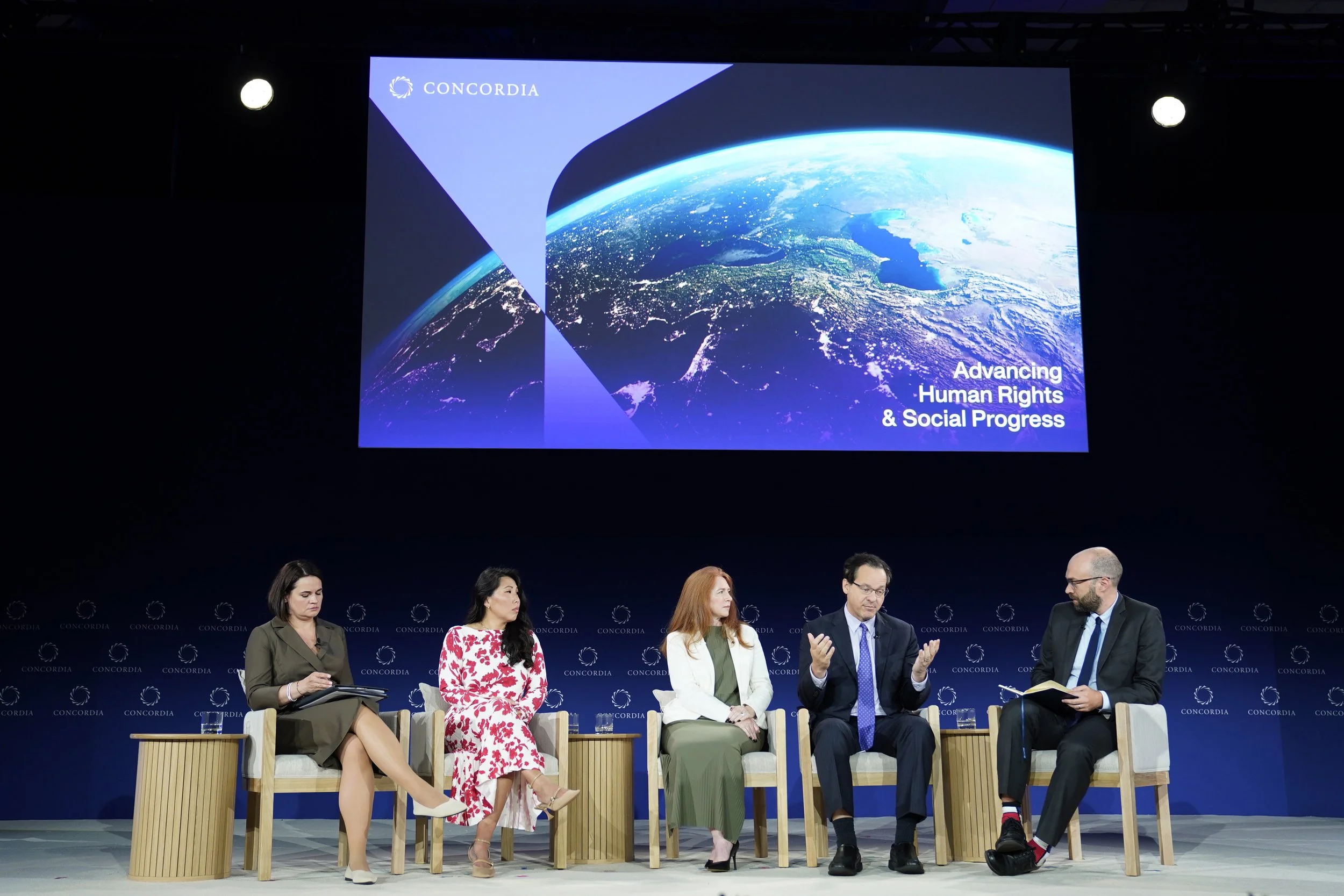The Armenia Project Hosts Concordia Summit Panel on Global Press Freedom
Panel featured top journalists, advocates, and Belarus opposition leader and political activist Tsikhanouskaya
Press freedom described as under strain from authoritarian repression, financial collapse, and AI disruption
Speakers urged practical solutions for sustaining independent media
(L-R) Sviatlana Tsikhanouskaya, opposition leader of Belarus, Laura Manley, Executive Director, Harvard Kennedy School, Shorenstein Center, Jodie Ginsberg, CEO, Committee to Protect Journalists, Jared Genser, Managing Director, Perseus Strategies, and Joshua Keating, Senior Correspondent, Vox, speak onstage during the 2025 Concordia Annual Summit at Sheraton New York Times Square on September 23, 2025 in New York City. (Photo by Riccardo Savi/Getty Images for Concordia Annual Summit)
New York, NY — September 23, 2025 — At this year’s Concordia Annual Summit during the United Nations General Assembly (UNGA) week, The Armenia Project (TAP) convened a high-level panel on the erosion of traditional media, driven by the rise of social platforms, the spread of AI, and declining revenues.
The session, titled “On the Brink? Is Media Freedom at Risk? A Global Perspective on Press Freedom,” brought together global experts to address the mounting pressures on independent media, especially smaller outlets that lack the sustained funding to weather the current storm. Moderator Joshua Keating of Vox Media opened by noting that the discussion came “in a moment of crisis” for journalism — economic collapse, political repression, and the looming specter of AI disinformation.
International human rights lawyer Jared Genser, Managing Director of Perseus Strategies, warned that the problem was worsening on a global scale, pointing to the latest Press Freedom Index: “Six of ten countries worldwide have seen declines in press freedom in just the past year — historic lows we’ve never seen before.”
For Jodie Ginsberg, CEO of the Committee to Protect Journalists, the impunity with which violence against reporters is carried out was most alarming. “At least eight out of ten journalist murders go unpunished,” she said, “creating an environment where governments feel they can literally get away with murder.”
The conversation also underscored how rapidly the information landscape was changing. Laura Manley, Executive Director of the Shorenstein Center at Harvard Kennedy School, stressed that most global news consumers no longer rely on traditional outlets. “Fifty-six percent of people now get their news from social media,” she said, urging a broader definition of media that includes new digital platforms.
Bringing a personal dimension to the stakes, H.E. Sviatlana Tsikhanouskaya, the Belarus opposition leader, described how her husband had been jailed for blogging and how exiled outlets remain a lifeline. “Any dictatorship starts with pressure on free media,” she reminded the audience, calling for sustained international support to ensure that independent journalism in exile does not disappear.
The panel did not stop at outlining the threats; it also pressed for solutions. Speakers emphasized the need for larger media organizations to strengthen smaller outlets, for regulators to hold platforms accountable without stifling innovation, and for donors and governments to provide consistent funding to stabilize the fragile ecosystem of independent journalism. In addition, panelists said news consumers should be encouraged to check a wider array of sources and be alert to social media disinformation.
As participants made clear, the urgency could not be greater. The economic foundations of independent news have been hollowed out, leaving smaller outlets especially vulnerable to capture. Civil society, too, finds itself in the crosshairs — from Moscow and Ankara to Caracas and Baku — as regimes work to silence dissent and cut off international support. Adding to the challenge, the vast reduction in USAID disbursement has undermined civil society and media literacy efforts in developing democracies like Armenia.
About The Armenia Project (TAP)
The Armenia Project is a nonprofit educational organization dedicated to advancing Armenia’s democratic and economic development by enhancing its communications ecosystem. Through storytelling, media engagement, and global partnerships, TAP brings international attention to urgent challenges while empowering civil society.

